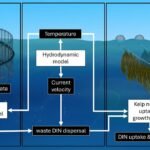Aquaculture together with mussels allows kelp to grow better and be more resilient to climate changes. This finding is from studies in a new doctoral dissertation at the University of Gothenburg.
The majority of food production around the world uses monocultures, where only one species is cultivated, such as wheat on land or salmon farms at sea. These systems are productive but have a major impact on the environment.
Instead of cultivating one species, cultivating multiple species is an option.
“The goal is to co-cultivate different species to create a mini ecosystem where the by-products from one species can be used by another. The aim is to prevent valuable nutrients from being lost into the marine environment while also harvesting multiple species,” says Matthew Hargrave, the author of the dissertation.
Better farming conditions with kelp together with mussels
In one of the studies, kelp was cultivated together with mussels in a commercial mussel farm.
“In my study, I discovered that kelp grew larger when combined with mussels while also becoming cleaner. One of the biggest problems with aquaculture is the unwanted growth of other organisms, which lowers the quality of the harvest. My study showed that mussels filter out larvae from other organisms that would otherwise have colonised the kelp.”
Since the mussels also filtered out particles from the water, the water became clearer, which allowed more sunlight to reach the kelp and allowed them to grow more.
Algae become more resilient to climate changes
Stay Always Informed
Join our communities to instantly receive the most important news, reports, and analysis from the aquaculture industry.
Another study by the dissertation author, Matthew Hargrave, showed that better nutrient conditions made algae more resilient to climate changes. Lower salinity in the sea is one of the three major impacts of a changing climate.
“Low salinity can be a stress factor for algae and harm health. By providing extra nutrients and simulating a co-cultivation of several species, the algae, sugar kelp, oarweed and sea lettuce, gained additional resources to protect against the effects of stress.”
Contact information:
Matthew Hargrave completed his doctorate at the Department of Marine Sciences, University of Gothenburg. Mobile: +46 (0)76-622 96 73, email: matthew.hargrave@gu.se
Reference:
Hargrave, Matthew Simon. 2021. New Perspectives in Multi-trophic Aquaculture. Göteborgs universitet. Naturvetenskapliga fakulteten.
Source: The University of Gothenburg
Editor at the digital magazine AquaHoy. He holds a degree in Aquaculture Biology from the National University of Santa (UNS) and a Master’s degree in Science and Innovation Management from the Polytechnic University of Valencia, with postgraduate diplomas in Business Innovation and Innovation Management. He possesses extensive experience in the aquaculture and fisheries sector, having led the Fisheries Innovation Unit of the National Program for Innovation in Fisheries and Aquaculture (PNIPA). He has served as a senior consultant in technology watch, an innovation project formulator and advisor, and a lecturer at UNS. He is a member of the Peruvian College of Biologists and was recognized by the World Aquaculture Society (WAS) in 2016 for his contribution to aquaculture.




